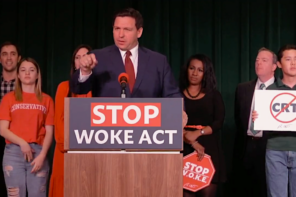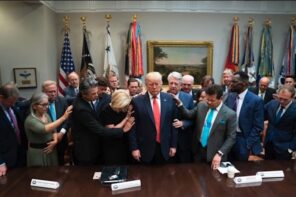In his first State of the Union address, Donald Trump wagged his finger and declared, “the motto is In God We Trust.” He was, of course, talking about the national motto, designated by Congress in the 1950s as part of the post-war culture of anti-communism. It replaced the original motto E Pluribus Unum (out of many, one) which spoke to the spirit of unifying the diverse nation of the founding era.) Rep. Jody Hice (R-GA) told CBN News that he “was moved by the president’s commitment to God.”
The disingenuousness of these and allied pols has set the tone for much that has happened since. And there are indications that this may become more the rule than the exception. If so, the experience and example of State Senator John Marty (D-MN) may be instructive.
Marty was smeared on Fox News after he opposed a legislative amendment that would allow for the display of In God We Trust in the public schools. The bill’s sponsor, Republican Senator Dan Hall, described Marty as part of an “anti-faith movement” that seeks to “suppress” religion and “wipe it out of government.” Hall went on to say it was a matter of “religious freedom” to post In God We Trust in the schools.
This was consistent with the 2018 legislative playbook of a Christian Right initiative called Project Blitz, first reported by Religion Dispatches in April. Project Blitz comprised 20 suggested model bills and resolutions that concerned such things as the promotion of Christianity in public life; the teaching of a Christian nationalist version of American history, and providing for religious exemptions from civil rights laws. This year, Alabama, Florida, Arizona, Louisiana and Tennessee passed laws requiring or allowing public schools to display the U.S. motto, “In God We Trust.” The Minnesota legislation, which included an In God We Trust amendment, passed but was vetoed by the governor. Marty expects the issue will be back in some form in 2019.
As Project Blitz strategists saw it, they could gain political advantage by getting opponents on the record, so their votes and statements could be used against them. But in this instance, they tried to bully the wrong pol.
In a subsequent appearance on Fox, Marty defended the integrity of his faith and his stance against the In God We Trust amendment. He insisted that posting of In God We Trust in the public schools is “offensive” to both religious believers and the non-religious. And, speaking as a Christian, he said that the “government sanctioned motto does not strengthen our religion, but it demeans, devalues and cheapens our religion.” Apparently, rather than continue to give Marty a platform, the smears stopped.
Senator Marty takes his faith seriously. He explains that he is “the great grandson of a Lutheran minister, the grandson of a minister, the son of one, the brother of a minister, and soon, the father of one.” As it happens, his father is not just any minister, but Martin Marty, one of the most prominent religious scholars and theologians of our time.
He obviously takes politics and public service seriously as well. As a legislator for 30 years, he’s become well known as a leader in the fights for marriage equality, environmental protection, campaign finance reform, and universal health care.
Senator Marty agreed to talk with RD about what this episode tells us about religion and public life in the age of Trump.
RD: During the floor debate, and in your appearance on Fox, you argued that the posting of In God We Trust in the public schools is “offensive” to both religious believers and non-religious, and that a “government sanctioned motto” is essentially an affront to religion itself.
Please say more about how you think this is so and why people should be concerned.
JM: Maybe I shouldn’t be, but I am continually surprised that people who say they want a smaller, less intrusive government are so eager to promote this intrusion of government into the most personal parts of our lives.
In the Senate, I spoke out on behalf of the 21 percent of the public who do not believe in God, and on behalf of many of the 79 percent who (according to the author of the legislation) do hold religious beliefs. The In God We Trust motto is certainly not a welcome message to people who do not believe in God, or to people who believe in different gods, or to Christians who don’t want government interfering with their religion and telling them what to believe.
Posting “In God we Trust” in schools is neither respectful nor welcoming to the non-religious and to those who hold different religious beliefs. This is more than a philosophical matter. We know that religious minorities or students who don’t believe in God are often bullied for being different. Posting this motto can leave them feeling that the school is backing the bullies. The bullies sense that too.
When I learned that the In God We Trust bills are part of a long term plan for conservative Christian domination, organized by Project Blitz under the rubric of religious freedom, I realized that this is a moment to sit up and take notice.
RD: So we have politicians promoting a generic god in the public schools and simultaneously stirring up Christian nationalism. What do you think is going on?
JM: Motto proponents make it clear they are promoting their Christian God. Yet, the author of the legislation argued in the Senate that he considers “God” to be generic for any faith.
Speaking as a Lutheran, I don’t want my religious beliefs watered-down by simplistic, generic, politically motivated, government-sanctioned mottos or practices. My faith teaches a radical love and respect for others. It teaches welcoming the refugee and showing compassion to those who are hurting. It does not advocate for the use of religious beliefs to divide. I spoke out for many who have a deep Christian faith and who don’t want our government to use our religion as a divisive club to beat up others for political reasons. And, we don’t want to force our beliefs on others.
Most Americans are Christian of one sort or another. So, some politicians talk about this being “a Christian nation,” knowing that appeals to many of those Christians. But at the same time, they don’t want to turn off other voters.
For their political base, the idea that government is sanctioning, in relatively generic terms, what they consider to be their religion, is a comforting thought. Those voters like official promotion of watered-down religious beliefs. They can show their commitment to their religion without doing anything; the government is doing it for them.
They appreciate public displays of religion just as they like public shows of patriotism—it is easier to show your patriotism by expressing outrage at NFL players kneeling during the National Anthem than it is to get up off one’s couch and stand at attention during the anthem when watching the game at home on TV.
Many of the proponents want to proselytize and promote their religious beliefs—something that is perfectly appropriate for individuals or groups or churches to do. But it is not appropriate for government to select certain religious beliefs and officially sanction and promote them.
RD: Our country’s approach to creating a culture of unity has certainly been more aspirational than entirely successful. But most of us seem to still agree on foundational values involving a commitment to religious pluralism, religious freedom, and separation of church and state. But it’s also my sense that we’ve taken what progress we’ve made for granted. And that we’ve allowed the knowledge, vocabulary and skill set we need to make it work, to atrophy.
What do you think we can do about this as citizens and public officials?
JM: Overall, I think we have had considerable success in the American experiment in finding a vibrant unity in our democracy—even as we struggle to achieve the kind of just society to which most of us aspire. I agree that we have taken our progress for granted and let that understanding atrophy.
There are two main things we can do. In these times when so many politicians use religion to score political points, we need to redouble our efforts at civic education—about the Bill of Rights and the First Amendment. These efforts are more challenging in an era of “alternative facts” but more necessary than ever. Second, we need our leaders to set a good example by framing relevant issues in terms of the foundational values of religious freedom and separation of church and state.
RD: Many are rightly concerned about rise of white supremacist, anti-Jewish and anti-Muslim bigotry. But your experience suggests that many white Christians may not be as safe as they may think. After being smeared as anti-faith on Fox, you wrote on Facebook that you “Came home from church this morning to a vile, obscene voice message attacking me for hating religion. Also, several angry emails and Twitter messages attacking me as anti-religious and un-American.” Nevertheless, you went on Fox and forcefully defended yourself.
How should the rest of us, religious and non-religious, Christian and non-Christian, respond to this rising, aggressive culture of threats, smears, and religious bullying?
JM: We certainly need to stand together, particularly with the targets of discrimination and oppression. It takes courage and commitment. But there is an extra onus on public figures who are Christians to speak out in opposition to this Christian Nationalism movement.
When those of us who are Christian speak out, we have the potential to persuade people to reconsider their support of this divisive campaign. For example, when I tell that story of coming home from church to a call attacking my lack of religious beliefs, some people see the irony and absurdity and begin to question the merits of the In God We Trust bill.
RD: When you spoke up for marriage equality in Minnesota, the issue was often cast as a matter of religious faith vs. civil rights. But you derailed that narrative when you said that you favored marriage equality because of your faith, not in spite of it. You were certainly far from alone in that. But this gets us to a knotty question:
How should citizens and public officials approach competing faith claims about matters of public policy?
JM: I don’t ordinarily talk about my religious faith when discussing political issues in the Senate. My religious faith shapes who I am and what I believe. But as a public official, I am accountable to the people I serve for the policies I support and the positions that I take. I am on the ballot, not my religion.
Fifteen years ago, I wrote and spoke about my support for gay marriage coming from my religious faith, not despite it. This was in response to people asserting that because their religious beliefs held that same-sex marriage was evil and sinful, the Minnesota Constitution should be amended to ban it.
Nobody has an exclusive claim on Christianity or any religion, so I felt it was important to show that there are people with strong religious beliefs who favored marriage equality.
I spoke about how my faith teaches that we are to treat others the way we want to be treated. How my church, like many others, promotes making a sacred, lifelong bond between couples who love each other. That we promote marriage and work to strengthen families of same-sex couples just as heterosexual ones. For me, the many scripture passages on love and commitment, on honesty and fidelity, on compassion and understanding, and on the importance of parents caring for each other and their children are more compelling than the handful of verses that have been used by others to argue against homosexuality.
I also explained that if a church opposes same-sex marriages, the government should not force them to perform gay marriages. But by the same standard, if a church wants to solemnize such marriages, the government should not intrude on their religious freedom either.
Only a fraction of the population favored gay marriage at the time, so I received angry, often hate-filled letters and emails condemning me for being anti-Christian. But by speaking out about the roots of my values and beliefs, I helped reshape public understanding of the issue.
There are and always will be competing faith claims in the public realm. Government should treat such claims respectfully, but it should not play favorites.





